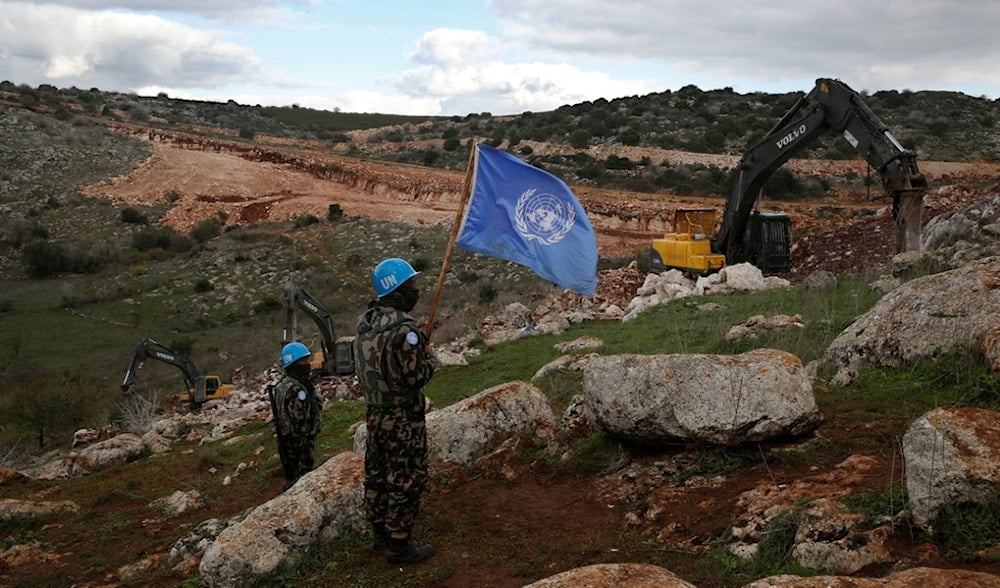NYT: Potential '60-day truce' in Lebanon taking shape
The New York Times and Israeli media outlets outline the key points that still need to be addressed to reach an agreement in Lebanon, emphasizing the potential for its achievement, amid the Israeli occupation's military and security recommendations to finalize the deal.
-

UN peacekeepers hold their flag, as they observe Israeli occupation forces conduct military operations, near the southern Lebanese border village of Mays al-Jabal, Lebanon, Dec. 13, 2019. (AP)
The American newspaper The New York Times has speculated that the framework for a potential ceasefire agreement on the Lebanon front is beginning to take shape, according to multiple regional and American officials familiar with the ongoing diplomatic efforts. However, they cautioned that key details concerning the agreement's implementation and enforcement remain unresolved.
Meanwhile, the Israeli newspaper Yedioth Ahronoth reported "Israel's" assessment that a ceasefire would be announced within a few days, following US envoy Amos Hochstein's return to the United States on Thursday night.
An informed source told the newspaper that "Hochstein agreed on the details with Lebanon, but a few matters are still pending."
The source added, "Significant progress was made in Hochstein's talks in Israel, and the agreement is nearly complete, though several issues still need to be addressed."
60-day 'truce' and a Supervisory Committee
The proposed agreement, according to the speculations reported by the New York Times, includes a "60-day truce" during which "Israeli forces would withdraw from southern Lebanon and Hezbollah fighters would pull back to the north of the Litani River."
During this period, the agreement reportedly stipulates that the Lebanese Army and UN peacekeeping forces (UNIFIL) will bolster their presence along the Lebanese-Palestinian border area.
In this context, The New York Times also reported the establishment of a new enforcement mechanism, known as the supervisory committee, which will be led by the United States to ensure that both Hezbollah and Israel remain outside the newly created buffer zone, where the Lebanese Army and UNIFIL are heavily deployed.
This mechanism, known as the supervisory committee, aims to monitor violations of the ceasefire and would be led by the United States. However, it remains unclear which other countries might participate in this mechanism or how it will operate, and it appears that a direct US military role has not been discussed.
The newspaper noted that "if the ceasefire holds for 60 days, negotiators hope it will become permanent," suggesting that this could occur under the administration of newly elected US President Donald Trump.
The New York Times also reported that "Israel" sought "the freedom to intervene against any Hezbollah activity discovered in southern Lebanon," a point that continues to be resisted by the Lebanese side.
Meanwhile, American officials told the newspaper that they are confident "Israel" is more eager to reach a ceasefire agreement in Lebanon than in Gaza, citing "Israel's" active participation in the Lebanese talks and a realistic assessment of options for the Israeli occupation forces.
They added that Israeli negotiators acknowledged the most efficient way to halt Hezbollah's ongoing missile fire toward northern settlements, which had prevented Israeli settlers from returning to those areas, was to reach a ceasefire agreement.
Outstanding issues
Other contentious issues in the agreement, as reported by an informed source to the Israeli news website Walla, include "Israel's" refusal to include France in the ceasefire agreement or allow its involvement in the international supervisory committee tasked with monitoring ceasefire violations.
According to the site, "Israel’s" objection to including France likely stems from the belief that the French judge at the International Criminal Court in The Hague, who issued arrest warrants for Israeli occupation Prime Minister Benjamin Netanyahu and former Security Minister Yoav Gallant, "would not have dared to take such action without the green light and support from French President Emmanuel Macron."
The report also noted that "Israel" is displeased with France’s stance on the Israeli occupation's military industries, as well as its exclusion from France's arms fair. Additionally, there are claims that France has hindered settlement negotiations by conducting indirect talks with Lebanon without coordinating with the United States.
Along with these issues, there remains ongoing debate in the negotiations over the language used to address the disputed border points.
Israeli occupation military, security establishments recommend an agreement
Meanwhile, Israeli Broadcasting Radio confirmed that the occupation's security establishment recommended reaching an agreement on the Lebanon front and presented this to the government, emphasizing that the decision rests with Prime Minister Benjamin Netanyahu.
In line with this recommendation, the Israeli occupation army also advised "reaching an agreement now," citing the heavy costs of the war with Hezbollah in recent times.
In turn, the Israeli occupation's Chief of Staff Herzi Halevi addressed Israeli occupation ministers, stating, "If you want to continue fighting, it comes at a very high cost, and you must be aware of that. Decide what you want to do."
Read more: Ali Hijazi: Lebanon's negotiator 'not pessimistic' regarding ceasefire

 5 Min Read
5 Min Read








